“We the people” finally became much more of a reality for women when Hillary Clinton accepted the Democratic Party nomination for President of the United States yesterday. She is the first woman to secure a major party nomination in the Presidential election.
To say that this moment has been a long time coming is understatement. It has been 240 years since the 1776 Declaration of Independence, which set off a revolution against the rule of monarchy and signaled the creation of a new nation with the ideals of freedom, liberty, and individual rights.
At the nation’s birth, however, the reality was far from the ideal. Originally, the right to vote was left up to the states, and it was deemed a legal privilege that most states at first reserved almost exclusively for white Protestant males who owned property. In each generation, many people have fought and sacrificed much to expand this limited definition and to have the founding documents of the United States of America and the expression of ideals live up to the promise of “we the people…” Yet, it took women 144 years after the nation’s founding to secure suffrage, in 1920 with the ratification of the 19th Amendment to the U.S. Constitution.
Surely, Hillary Clinton is as cognizant as anyone, if not more, of the sacrifices that so many women have made over the generations – including her own – to break the barriers. She arrives at this place in the middle of a Presidential election full of heated, at times frightening, rhetoric; a promise by the other major party opponent, Republican Donald Trump, of mass deportations of groups of people, among other dangerous threats; and many indicators of a nation of sharp divisions. Life and history move on day to day as the country works so imperfectly, but at times in inspiring ways, to confront the issues and challenges.
Still, consider that singular moment on Wednesday evening, July 27, after President Barack Obama delivered a stirring address to the Democratic Party convention endorsing Clinton. She came on the stage, and they embraced and stood there for some time. We were witnessing the first African-American President standing with the first woman to be a major party nominee and have a real opportunity to become President. It’s worth stopping to understand and appreciate how far the country has come and how much each generation has had to be vigilant to ensure we do not go backwards.
Yes, it has been a long time coming, nearly two-and-a-half centuries. As Clinton formally accepted the Democratic Party nomination on Thursday, July 28, it’s important to remember and honor the women who paved this long, arduous pathway, with toil, blood, and suffering, through injustice, indignities, and setbacks. We don’t know the names and lives of many of those women, most of whom are now gone. Many citizens aren’t even aware of what others have done to get to this day, or they take the passing of this threshold for granted.
So it’s very worthwhile to commemorate and pay tribute to several leaders who gave much and took risks to bring the country to this day, examining their own words as inspiration. Very many others deserve such honor as well, in seeking to win women’s right to vote, organizing grass-roots activist groups, and running for political offices at the local, state, and federal levels. For those who have passed on, their spirits are surely with the country today.
Susan B. Anthony
Raised in a Quaker family, Susan B. Anthony was an activist for labor rights, temperance, African-American rights, educational opportunities for working women, and equal pay for equal work. But Anthony made the main commitment of her life to obtaining women’s right to vote, as the National Women’s History museum notes. Her friendship with Elizabeth Cady Stanton was a pivotal partnership in leading the suffrage movement for more than a half-century, and Anthony campaigned throughout the United States to win women the right to vote.
Anthony persisted through much resistance over many decades, and her sisters witnessed her dogged efforts as she often became the public face of the fight. Some newspapers ridiculed her as a fanatic. In 1872, she and a group of women came to the polls to vote. Authorities arrested, indicted, tried, and fined Anthony for voting in the Presidential election. Anthony died in 1906, 14 years before women won the right to vote throughout the United States.
In this passage, from an 1873 speech Anthony gave after her conviction, she speaks of the preamble to the U.S. Constitution.
“It was we, the people; not we, the white male citizens; nor yet we, the male citizens; but we, the whole people, who formed the Union. And we formed it, not to give the blessings of liberty, but to secure them; not to the half of ourselves and the half of our posterity, but to the whole people – women as well as men. And it is a downright mockery to talk to women of their enjoyment of the blessings of liberty while they are denied the use of the only means of securing them provided by this democratic-republican government – the ballot.”
Elizabeth Cady Stanton
Born in New York State in 1815 and well-educated compared with most of her fellow females of the day, Elizabeth Cady Stanton first became involved in the anti-slavery movement. Put off by its exclusion of women, Stanton and Lucretia Mott called and organized the first Woman’s Rights Convention in 1848 at Seneca Falls, N.Y., as a National Women’s History Museum biography details. Out of the convention came the Declaration of Sentiments, which set out the rights to which women are entitled.
For more than 50 years, Stanton worked tirelessly in close cooperation with Anthony and others for the cause of women’s suffrage and advancement. Like Anthony, she never lived to see the culmination and success at the federal level of the fight for suffrage, passing away in 1902, 18 years before the ratification of the 19th Amendment.
This passage is from “The Solitude of Self,” the speech Stanton delivered in 1892 upon resigning at age 77 as the first president of the National American Woman Suffrage Association (NAWSA).
“To throw obstacles in the way of a complete education is like putting out the eyes; to deny the rights of property is like cutting off the hands. To refuse political equality is to rob the ostracized of all self-respect, of credit in the market place, of recompense in the world of work, of a voice in choosing those who make and administer the law, a choice in the jury before whom they are tried, and in the judge who decides their punishment.”
Stanton was the primary author of the Declaration of Sentiments, signed by 68 women and 32 men at the 1848 convention in Seneca Falls. This excerpt is from the declaration:
“We hold these truths to be self-evident; that all men and women are created equal; that they are endowed by their Creator with certain inalienable rights; that among these are life, liberty, and the pursuit of happiness; that to secure these rights governments are instituted, deriving their just powers from the consent of the governed. Whenever any form of Government becomes destructive of these ends, it is the right of those who suffer from it to refuse allegiance to it, and to insist upon the institution of a new government, laying its foundation on such principles, and organizing its powers in such form as to them shall seem most likely to effect their safety and happiness.”
Carrie Chapman Catt
Carrie Chapman Catt’s early life centered on education, as she worked as a teacher, principal and superintendent in Iowa. She first worked for women’s suffrage in Iowa, in the late 1880s. As an accomplished organizer, strategist, and fund-raiser, she rose in prominence in the movement and eventually became the president of NAWSA in 1900. She retired from the movement to care for her ailing husband, George Catt, but then returned to campaign to win suffrage in New York State, in 1917. At a time when NAWSA was struggling, Catt took charge and devised a multi-level plan to win suffrage, in fact possessing a single-minded focus that looked at other issues, at the time, as distractions.
Finally, the painstaking effort state by state broke through to national success. Catt was one of the leaders who saw the long battle ultimately succeed, when Tennessee became the 36th state to ratify the suffrage amendment and it became the law. Her efforts didn’t stop with this campaign, as she founded the League of Women Voters and became a peace activist.
This passage is from the speech that Catt gave, on Aug. 26, 1920, upon the passage of the 19th amendment.
“The vote is the emblem of your equality, women of America, the guarantee of your liberty. That vote of yours has cost millions of dollars and the lives of thousands of women. Money to carry on this work has been given usually as a sacrifice, and thousands of women have gone without things they wanted and could have had in order that they might help get the vote for you. Women have suffered agony of soul which you can never comprehend, that you and your daughters might inherit political freedom. That vote has been costly. Prize it!
The vote is a power, a weapon of offense and defense, a prayer. Understand what it means and what it can do for your country. Use it intelligently, conscientiously, prayerfully. No soldier in the great suffrage army has labored and suffered to get a `place’ for you. Their motive has been the hope that women would aim higher than their own selfish ambitions, that they would serve the common good.
The vote is won. Seventy-two years the battle for this privilege has been waged, but human affairs with their eternal change move on without pause. Progress is calling to you to make no pause. Act!”
Margaret Chase Smith
Born in the small town of Skowhegan, Maine, Margaret Chase Smith became known for her strong independent streak. She first became a member of the U.S. House of Representatives after her husband, Clyde, a Congressman, died in 1940 while in office. Smith ran in a special election and took over her husband’s seat. A moderate Republican, Smith then won election to the U.S. Senate in 1948, becoming the first woman to be elected to both houses of Congress.
Smith at times spoke up when others were reluctant to do so. In the Senate, Smith was the first Republican Senator to condemn Senator Joseph McCarthy’s anti-Communist witch-hunt. She did so in a speech known as the “Declaration of Conscience,” in which she decried the senators’ failure to uphold the Constitution and said that the “American people are sick and tired of being afraid to speak their minds lest they be smeared as `Communists’ or `Fascists’ by their opponents.”
Winning her third Senate term in 1960, Smith had gained a following nationally. In 1964, she became the first woman to run a credible race for President, seeking the GOP nomination. The media and the political establishment, in many ways, didn’t take her candidacy seriously. The Associated Press, for example, reported that Smith “daintily tossed her bonnet into the Presidential ring,” according to The New Yorker.
Smith planned to make her intentions regarding the 1964 Presidential election known in a speech on Jan. 27 of that year. This passage shows both the clever, understated way she handled it, as she paused before revealing her plans, and her resolve to go against the odds.
“There are those who make the contention that no woman should ever dare to aspire to the White House – that this is a man’s world and that it should be kept that way. I find the reasons advanced against my running to be far more impelling. So because of these very impelling reasons against my running, I have decided that I shall enter the New Hampshire preferential primary and the Illinois primary.”
Shirley Chisholm
Shirley Chisholm forged a historic pathway as the first African-American woman elected to the U.S. Congress and later the first African-American candidate for a major party nomination for the Presidential election. Born in 1924 in Brooklyn to immigrant parents, she was a teacher and child care worker in her early life. When a professor at Brooklyn College first suggested Chisholm should consider politics, she felt that she had two obstacles to overcome – being an African American and a woman. After political involvement at the local and state level, she ran for Congress in 1968 – using a campaign slogan of “Unbought and Unbossed” – and won, going on to serve 14 years in the House of Representatives. During her second term in Congress, she decided to run for President, in the 1972 election. Overall, Chisholm drew votes from citizens in 14 states.
This passage of Chisholm’s reflects her belief of what is demanded of women to change the status quo.
“Women in this country must become revolutionaries. We must refuse to accept the old, the traditional roles and stereotypes…We must replace the old, negative thoughts about our femininity with positive thoughts and positive action affirming it, and more. But we must also remember that we will be breaking with tradition, and so we must prepare ourselves educationally, economically, and psychologically in order that we will be able to accept and bear with the sanctions that society will immediately impose upon us.”
Hillary Clinton
In her address at the Democratic Party convention, Clinton said, “And so, my friends, it is with humility, determination, and boundless confidence in America’s promise that I accept your nomination for President of the United States.” It marked the crossing of a historic threshold. It was a moment of import.
Clinton acknowledged the moment.
“Tonight, we’ve reached a milestone in our nation’s march toward a more perfect union: the first time that a major party has nominated a woman for President. Standing here as my mother’s daughter, and my daughter’s mother, I’m so happy this day has come. I’m happy for grandmothers and little girls and everyone in between. I’m happy for boys and men – because when any barrier falls in America, it clears the way for everyone.”
One cable TV correspondent during the afternoon after her acceptance in Philadelphia said that it would only become a big, truly important moment if she wins the Presidency. That’s not true, in my view. She has already scaled to a far height, and she didn’t have newspapers make light with headlines of her tossing her bonnet into the ring nor did she have to suffer through taunts or be put in jail for even trying to vote (though some are seeking to deprive others of their valid voting rights each year still). Others overcame those obstacles that women once faced, and now Clinton is redefining part of American history. Clinton has accomplished something that many believed not possible a generation ago – and she has endured much, in order to break one hugely significant glass ceiling.
Source: CNN
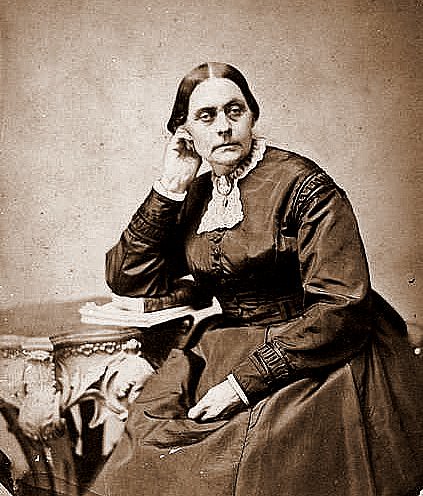
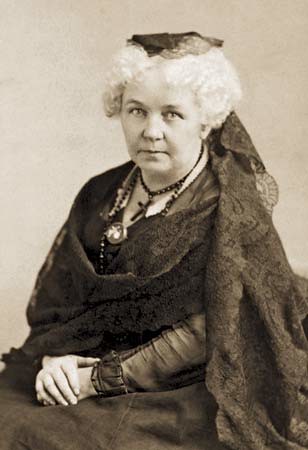
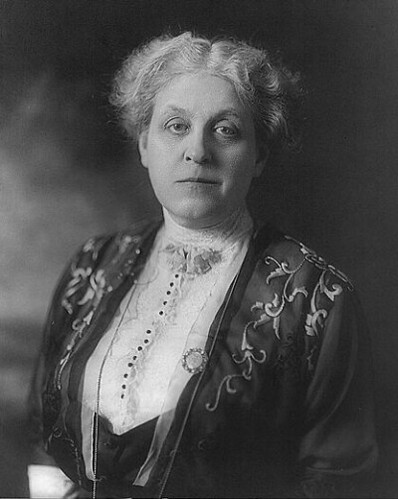
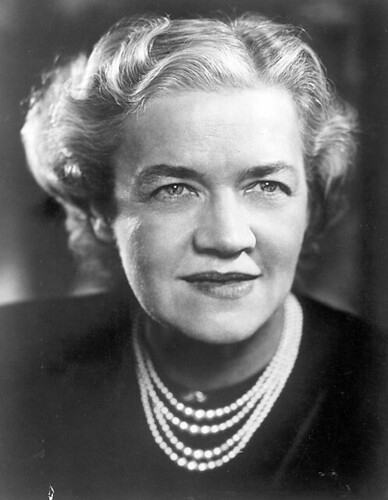
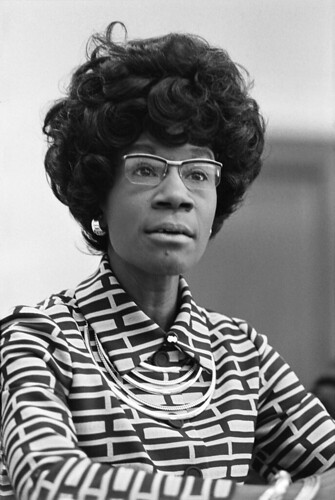



Love the Elizabeth Cady Stanton passage you quoted:
“To throw obstacles in the way of a complete education is like putting out the eyes; to deny the rights of property is like cutting off the hands.”
We need more speech-writing like that today.
Thank you! And I agree.
I was very struck by Elizabeth Cady Stanton’s language as well. Great ideas and language have the power to move people to great action. It’s something to consider that she gave this speech in 1892, after so many decades of working for women’s equality. I admire that so.
Here’s another example of her evocative words, in 1869 at the annual meeting of the American Equal Rights Association. It was a contentious time in which leaders fighting for suffrage for blacks and women tangled over whether one or the other should take precedence or how to win both, and charges and counter-chargers flew. That said, this passage is powerful:
“With violence and disturbance in the natural world, we see a constant effort to maintain an equilibrium of forces. Nature, like a loving mother, is ever trying to keep land and sea, mountain and valley, each in its place, to hush the angry winds and waves, balance the extremes of heat and cold, of rain and drought, that peace, harmony, and beauty may reign supreme. There is a striking analogy between matter and mind, and the present disorganization of society warns us that in the dethronement of woman we have let loose the elements of violence and ruin that she only has the power to curb. If the civilization of the age calls for an extension of the suffrage, surely a government of the most virtuous educated men and women would better represent the whole and protect the interests of all than could the representation of either sex alone.”
Beautiful words!
Thank you, Rebecca! I have been very inspired by what each of these women faced.
Susan